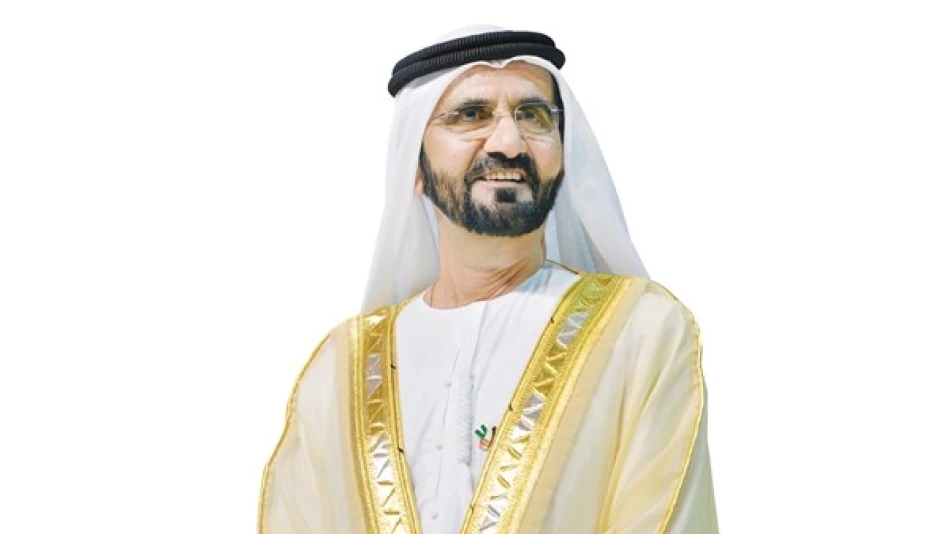
Dubai Dispute Resolution Law Enhances Quality of Life, say Officials
Dubai Pioneers Fast-Track Housing Dispute Resolution to Shield Citizens from Construction Delays
Dubai has enacted groundbreaking legislation to resolve housing construction disputes through specialized mediation and judicial mechanisms, positioning the emirate as a leader in protecting homeowner rights while accelerating project delivery. The new law establishes dedicated dispute resolution centers that combine alternative mediation with fast-track court proceedings, directly addressing one of the most persistent challenges in residential construction markets globally.
Streamlined Justice for Housing Projects
Dr. Saif Ghanem Al Suwaidi, Director of Dubai Courts, emphasized that the legislation reflects Sheikh Mohammed bin Rashid Al Maktoum's commitment to ensuring dignified living standards and family stability for UAE nationals. The law introduces an innovative dual-track system that integrates amicable settlement procedures with judicial oversight within clearly defined timeframes.
"This mechanism represents an innovative model that integrates amicable and judicial settlement within a specific timeframe, through specialized judges and experts," Al Suwaidi explained. The approach ensures that construction disputes—historically known for lengthy resolution periods—can be addressed swiftly without compromising legal thoroughness.
Supporting Dubai's Social Agenda 2033
The legislation directly supports Dubai Social Agenda 33, which aims to build an integrated society that achieves citizen happiness and welfare. By accelerating dispute resolution during construction projects, the law ensures that all work proceeds according to agreed specifications and timelines, reducing the uncertainty that often plagues homeowners during lengthy construction processes.
Alternative Dispute Resolution Takes Center Stage
Dr. Abdullah Saif Al Sabusi, Secretary-General of the Dubai Judicial Council, highlighted that the law represents a qualitative addition to Dubai's judicial system, reflecting a strategic shift toward enhancing alternative dispute resolution methods while ensuring justice is delivered quickly and efficiently.
The legislation establishes a specialized branch of the Amicable Settlement Center for Disputes, providing a sophisticated model for resolving conflicts effectively without requiring immediate recourse to traditional court proceedings. This approach mirrors successful alternative dispute resolution systems in Singapore and Hong Kong, where specialized construction tribunals have significantly reduced case backlogs.
High-Caliber Expertise
The new system will deploy specialized personnel with high competency levels to ensure speed and quality of procedures, serving the public interest while meeting citizens' aspirations for a safe and stable residential environment. This professional framework addresses a common weakness in construction dispute resolution: the lack of technical expertise among generalist judges and mediators.
Regulatory Framework for Construction Relationships
Engineer Marwan Ahmed bin Ghalita, Director General of Dubai Municipality, described the law as a crucial step toward enhancing the emirate's housing environment and confirming the leadership's commitment to providing dignified living conditions for citizens.
The legislation systematically organizes contractual relationships between citizens, contractors, and consultants, serving as an effective tool to ensure the sustainability of housing projects while avoiding potential consequences arising from construction contract disputes.
Urban Planning Integration
Dubai Municipality has committed all its capabilities and resources to achieving the law's objectives and contributing effectively to facilitating the implementation of citizen housing projects according to the best urban planning standards. This institutional backing ensures that dispute resolution mechanisms align with broader city development goals.
Global Context and Market Implications
Dubai's approach represents a significant evolution in construction dispute resolution, particularly relevant as global real estate markets face increasing complexity and cost pressures. Unlike traditional court systems that can take years to resolve construction disputes, Dubai's integrated model promises faster resolution times while maintaining legal rigor.
For investors and developers, this creates a more predictable legal environment that could reduce project risk premiums and insurance costs. The specialized expertise embedded in the system also suggests more technically sound decisions, potentially reducing the likelihood of appeals and further delays.
This legislative framework positions Dubai ahead of many international markets where construction disputes remain a significant source of project delays and cost overruns, potentially enhancing the emirate's attractiveness for both residential development and international construction companies seeking stable legal frameworks.
Most Viewed News

 Layla Al Mansoori
Layla Al Mansoori






